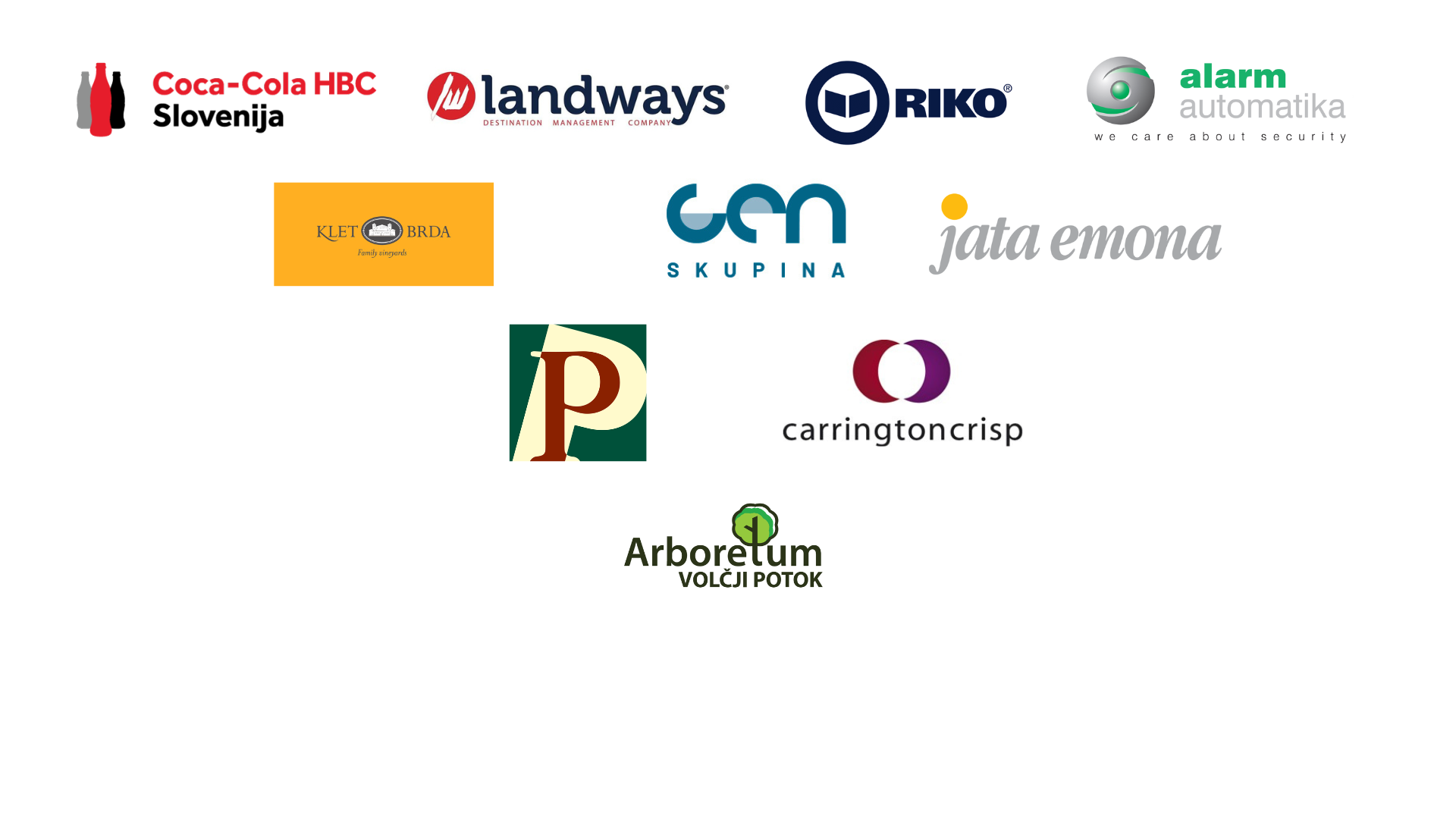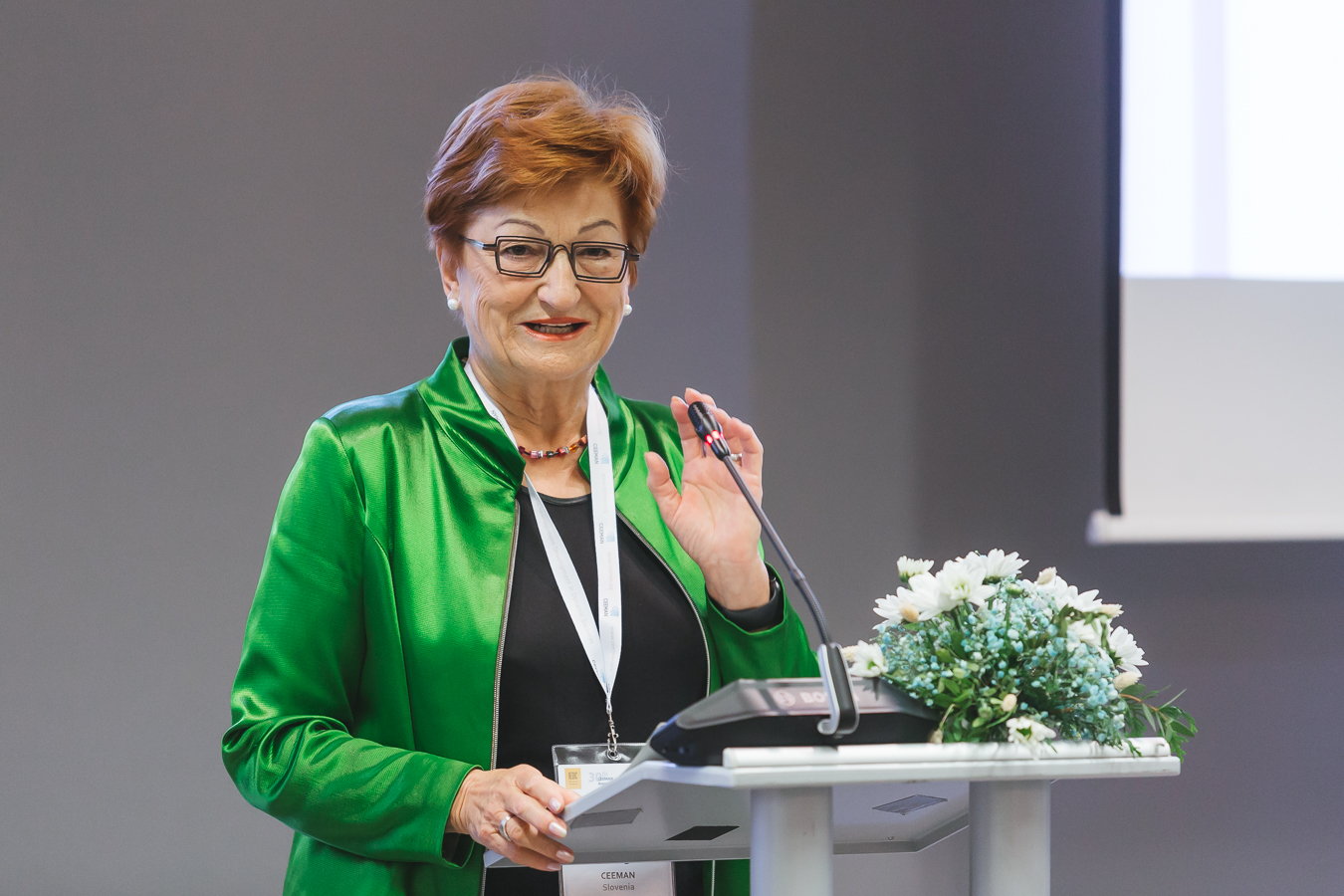 In her opening speech, CEEMAN President Danica Purg said: "Never has been our mission to bring people together more important. I am sure that together we can have an important impact on the “Big Picture” if we succeed to fulfil our mission to develop responsible managers and business leaders, for our environment, our countries and the world." Between 21-23 September 2022, participants noted the great content, quality of speakers, depth of the issues raised – and of course the joy of meeting in person again, feeling the commitment and passion of the CEEMAN network, and enjoying the unique atmosphere of Bled.
In her opening speech, CEEMAN President Danica Purg said: "Never has been our mission to bring people together more important. I am sure that together we can have an important impact on the “Big Picture” if we succeed to fulfil our mission to develop responsible managers and business leaders, for our environment, our countries and the world." Between 21-23 September 2022, participants noted the great content, quality of speakers, depth of the issues raised – and of course the joy of meeting in person again, feeling the commitment and passion of the CEEMAN network, and enjoying the unique atmosphere of Bled.
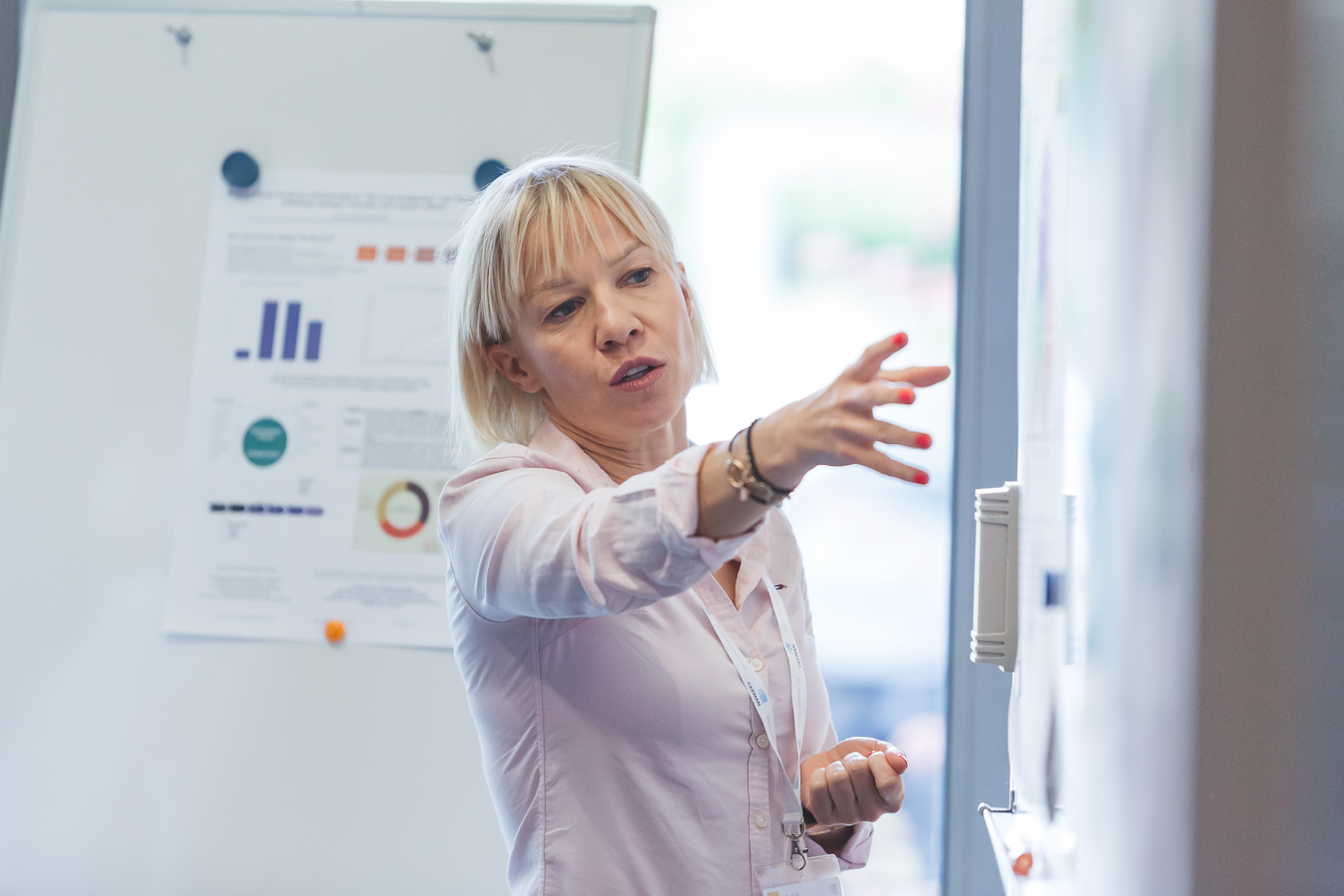 Pre-conference events on Wednesday, 21 Sept 2022, traditionally launched with Poster Session for faculty and researchers, moderated for the 10th time by Zoltan Buzady and gave us 7 presentations of latest research, teaching and best practices. CEEMAN IQA Director Ivo Matser together with his colleague Slađana Milašinović followed with an interactive IQA Session called IQA Quick-Scan on Excellence, Relevance and Dynamism. The participants were invited to assess their school’s current state through a set of questions which then gave them an assessment of where to start or put emphasis on their accreditation journey.
Pre-conference events on Wednesday, 21 Sept 2022, traditionally launched with Poster Session for faculty and researchers, moderated for the 10th time by Zoltan Buzady and gave us 7 presentations of latest research, teaching and best practices. CEEMAN IQA Director Ivo Matser together with his colleague Slađana Milašinović followed with an interactive IQA Session called IQA Quick-Scan on Excellence, Relevance and Dynamism. The participants were invited to assess their school’s current state through a set of questions which then gave them an assessment of where to start or put emphasis on their accreditation journey.
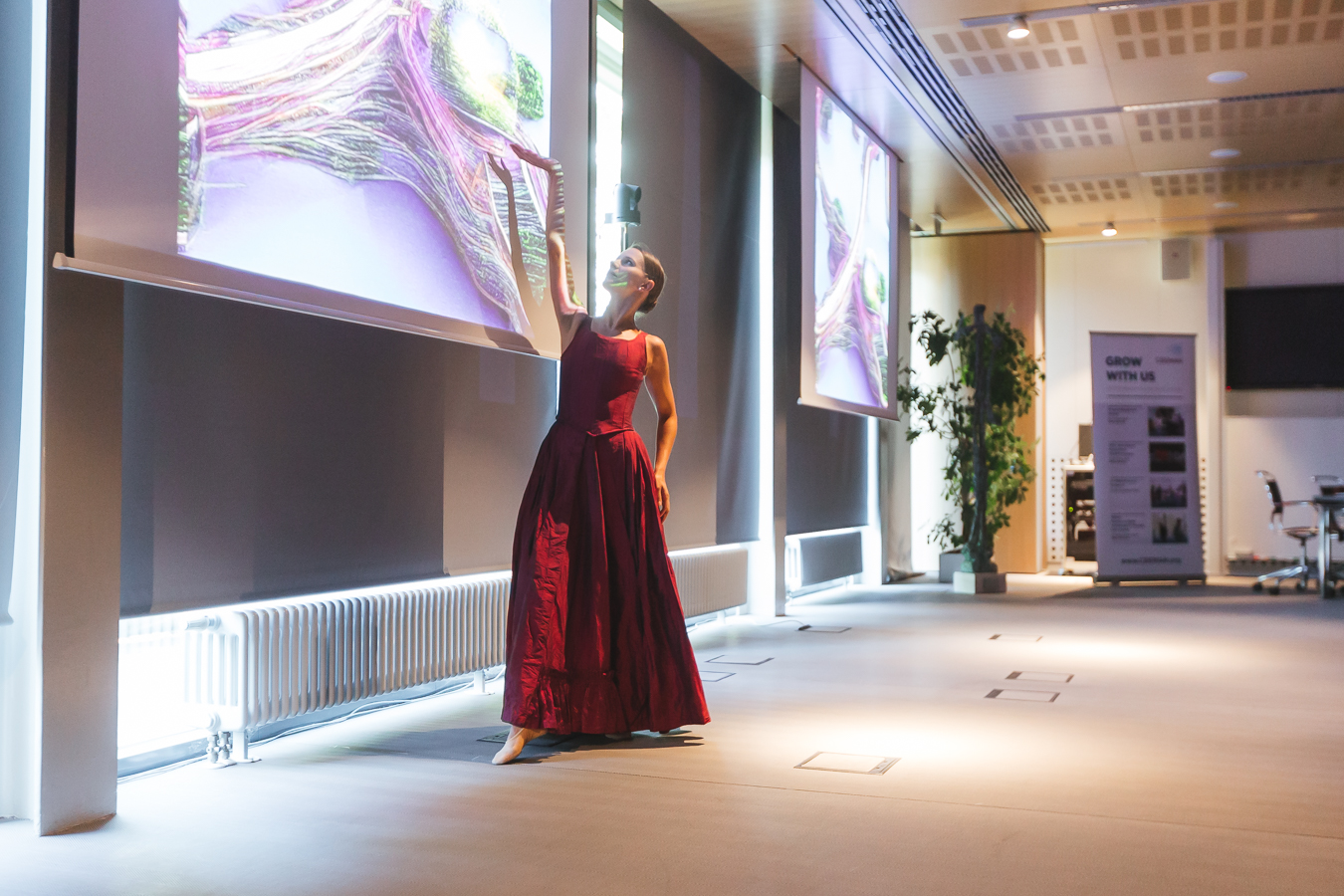 To set the tone of the event on 22 Sept, the organizers started the first day of the conference with a unique feature - an AI hybrid performance, which envisioned the future of management education. Some Rectors and Deans were asked to make 2-3 minutes of statement on “What would you say to your employees in 2027 to inspire them (looking at the past 5 years, the present and the future)?” Mr. Aigars Ceplītis, Creative Director of Audiovisual Media Arts Program at RISEBA University, and Ms. Sabrina Durling-Jones, a PhD candidate used the words in videos to create AI installation, combining management education, AI and art. AI algorithm generated the final video output and a soloist ballet dancer Tijuana Križman Hudernik responded with her beautiful ballet to the images projected. It was a shocking and an inspiring performance that we have never seen before!
To set the tone of the event on 22 Sept, the organizers started the first day of the conference with a unique feature - an AI hybrid performance, which envisioned the future of management education. Some Rectors and Deans were asked to make 2-3 minutes of statement on “What would you say to your employees in 2027 to inspire them (looking at the past 5 years, the present and the future)?” Mr. Aigars Ceplītis, Creative Director of Audiovisual Media Arts Program at RISEBA University, and Ms. Sabrina Durling-Jones, a PhD candidate used the words in videos to create AI installation, combining management education, AI and art. AI algorithm generated the final video output and a soloist ballet dancer Tijuana Križman Hudernik responded with her beautiful ballet to the images projected. It was a shocking and an inspiring performance that we have never seen before!
With their keynote speeches, Dr. Danilo Türk, former President of Slovenia and President of the Club of Madrid and Prof. Mette Morsing, Head of the United Nations PRME (Principles for Responsible Business Education) made important contributions to the discussion. Stefano Pilotto, Professor at MIB School of Management, Italy then concluded the keynote session with his presentation and discussion on the question of whether Europe will face the world’s challenges properly.
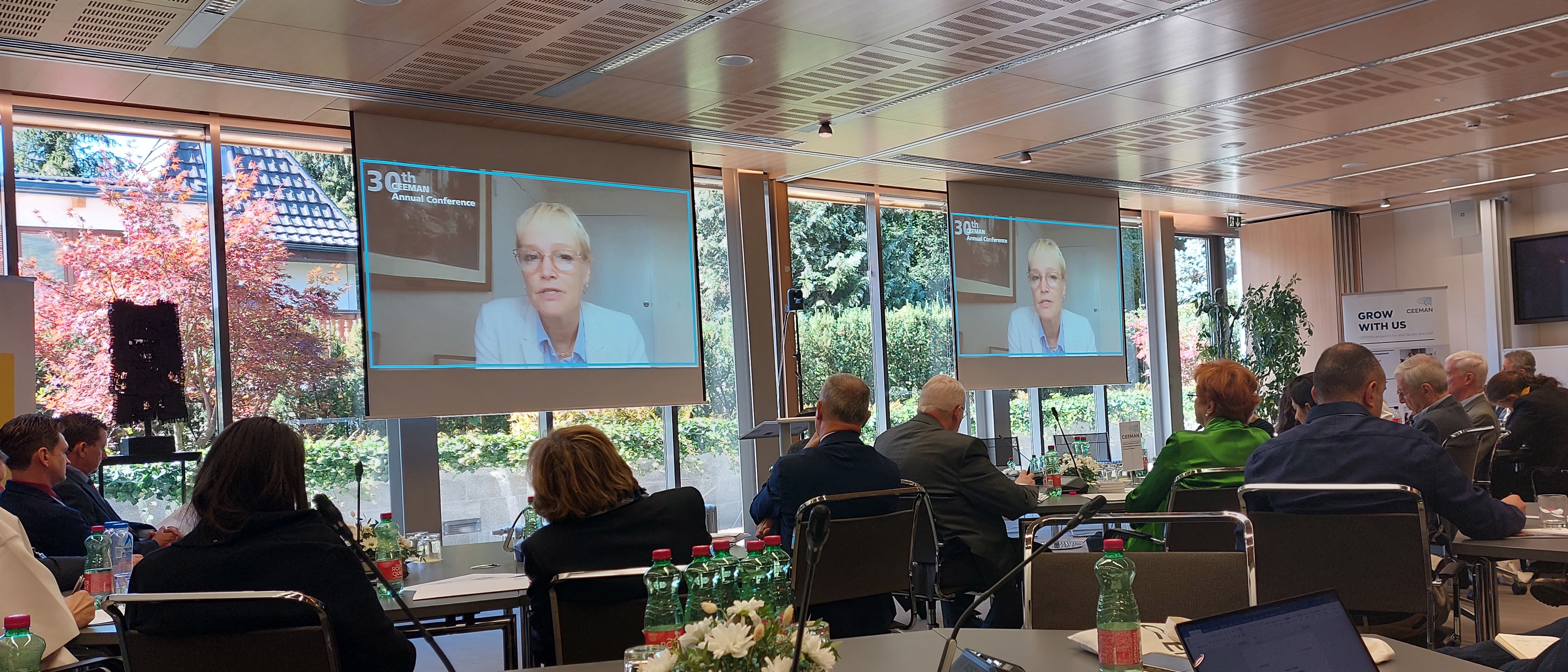
The conference was attended by more than 80 participants from 26 countries, including academics, deans, presidents and business leaders. Many prominent speakers reflected on the responsibility and mission of management education and the role of business schools in the future. "Dialogue between companies and educational institutions on their needs for further development is extremely important. Business schools need to teach managers common sense and adaptability, but above all we need to build mutual trust and respect." said Dr. Mark Pleško, co-founder and CEO of Cosylab, Slovenia.
Eser Sevinc Manav, General Manger Central Europe, The Coca-Cola Company highlighted the responsibility of big brands to share important messages with the public. "Companies have a responsibility to use their voices to highlight the need for more sustainable business, and they need to work with business schools to develop this."
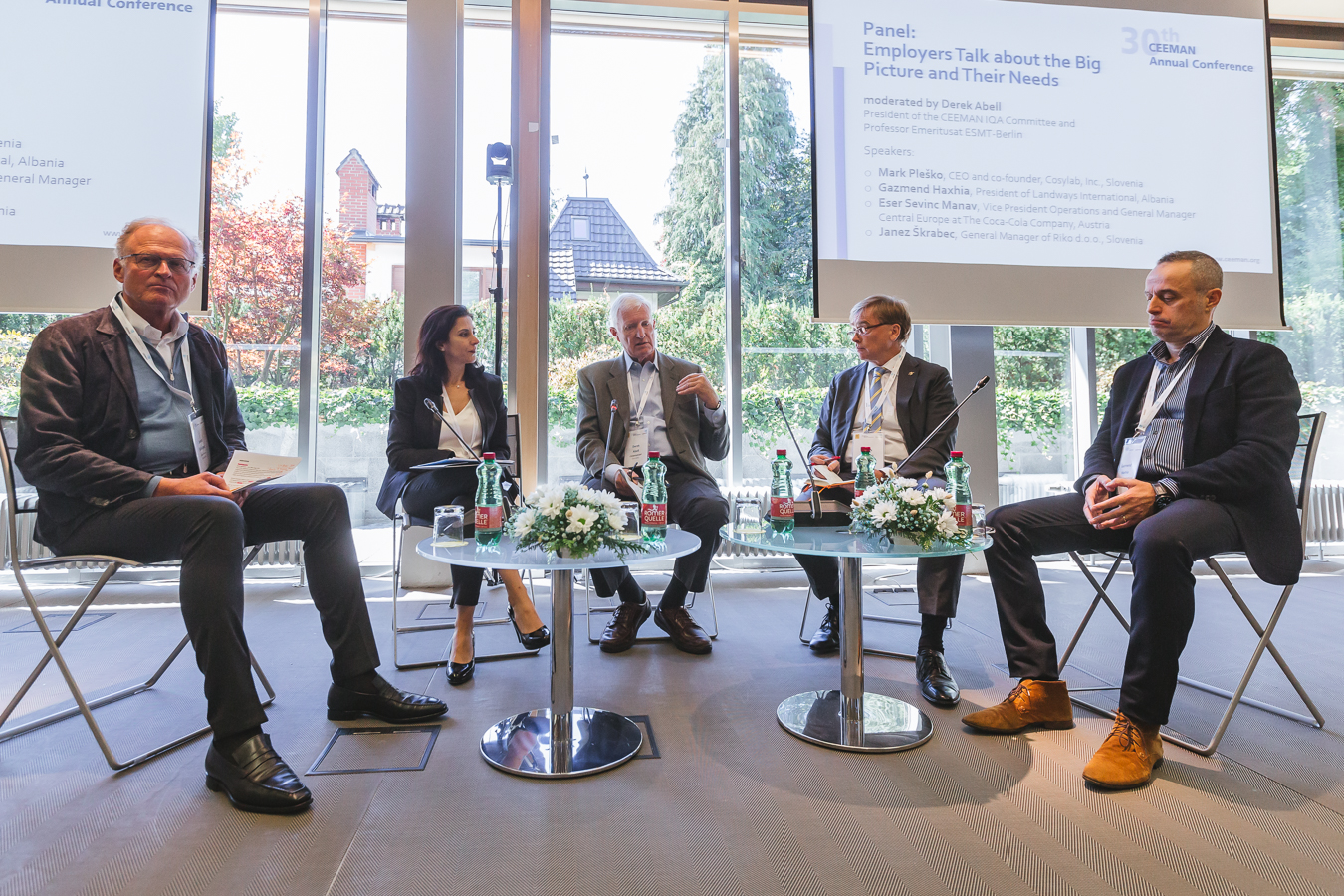
"Business schools have always been part of the bigger picture and therefore have an important impact on how we manage today's crises." said Janez Škrabec, CEO of Riko. "To be able to develop leaders of the future, they need to be ready for the change, and that requires a strong internal change in people, not just in the organisation. That's why schools need to be much more innovative and creative in their teaching." added Prof. Danica Purg.
Taking a modern approach to running discussions, a World Café Session of What Employers’ Needs Mean for Today’s Management Schools was moderated by Seán Meehan, Martin Hilti Professor of Marketing and Change Management at IMD Business School, Dean of Faculty, Switzerland.
 We took things out of the ordinary conference formats with “Reflections on the Lake” – another innovative feature and a very special group discussion that took place in “pletnas”, rowing boats on Lake Bled. IEDC MBA students, mixed with conference guests participated in the discussions – sharing their experiences and expectations of their degree. After that, CEEMAN President Danica Purg together with CEEMAN Board member prof. Irina Sennikova planted an oak tree in IECD gardens.
We took things out of the ordinary conference formats with “Reflections on the Lake” – another innovative feature and a very special group discussion that took place in “pletnas”, rowing boats on Lake Bled. IEDC MBA students, mixed with conference guests participated in the discussions – sharing their experiences and expectations of their degree. After that, CEEMAN President Danica Purg together with CEEMAN Board member prof. Irina Sennikova planted an oak tree in IECD gardens.
The conference was also attended by the deans of Ukrainian and Polish business schools, who shared their difficult experiences during the war in Ukraine. Polish business schools are a great example of how knowledge, emotions and humanity can help to address difficult situations such as mass exile due to war. It was extremely inspiring to hear in the second day of the conference how the business schools in Ukraine continued their mission and continued to educate. Their work and support for each other has brought them even closer together and they are sending realistic optimism among their people. The stories from Ukraine have encouraged many school representatives and CEEMAN members to continue to look for new innovative and creative ways to support business schools through partnerships to make education even more accessible, of high quality and relevant.
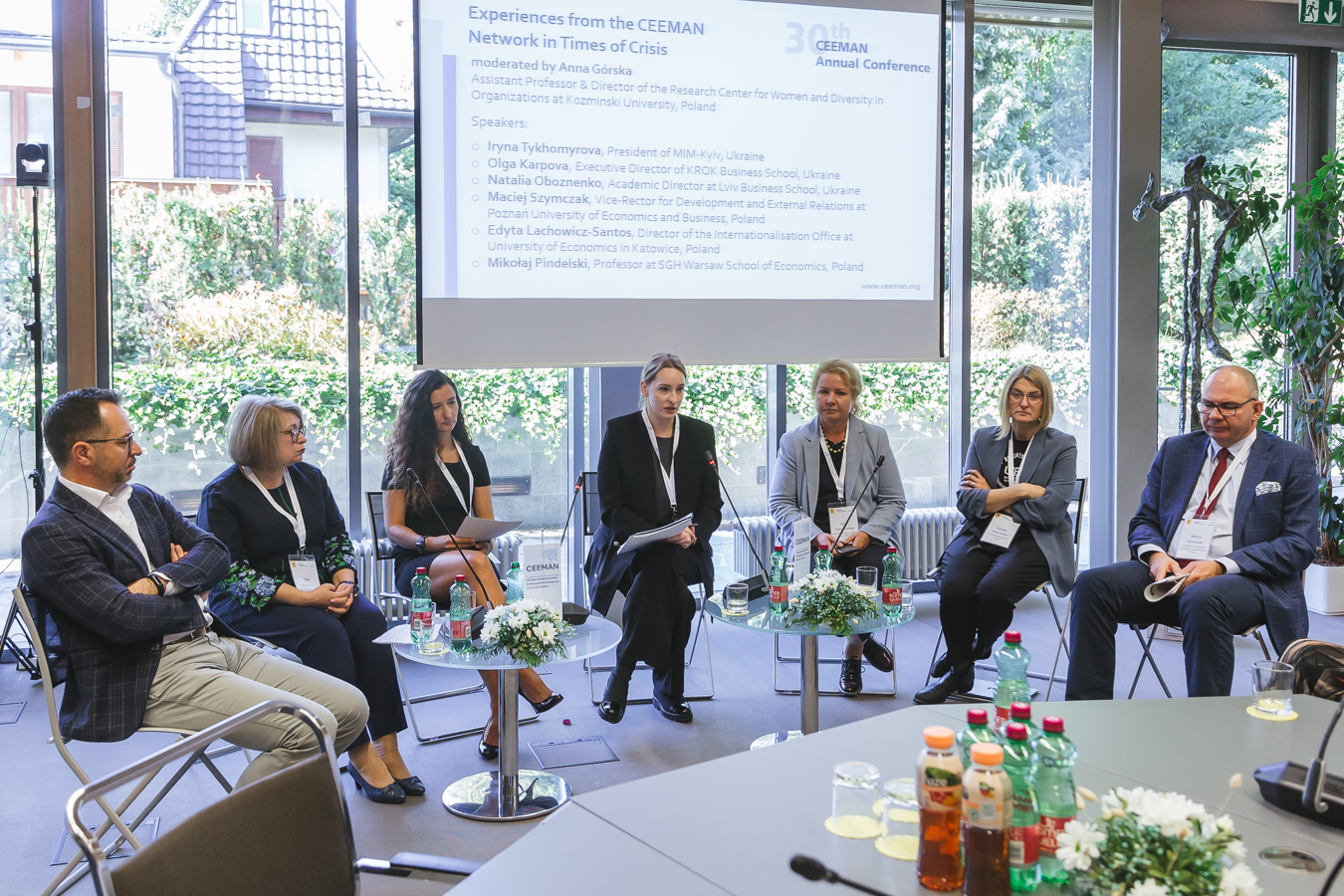
Experiences from the CEEMAN Network in Times of Crisis, moderated by Anna Górska, Assistant Professor & Director of the Research Center for Women and Diversity in Organizations at Kozminski University, Poland, gave us valuable insights from Iryna Tykhomyrova, President of MIM-Kyiv, Ukraine, Olga Karpova, Executive Director of KROK Business School, Ukraine, Natalia Oboznenko, Academic Director at Lviv Business School, Ukraine, Maciej Szymczak, Vice-Rector for Development and External Relations at Poznań University of Economics and Business, Poland, Edyta Lachowicz-Santos, Director of the Internationalisation Office at University of Economics in Katowice, Poland and Mikołaj Pindelski, Professor at SGH Warsaw School of Economics, Poland.
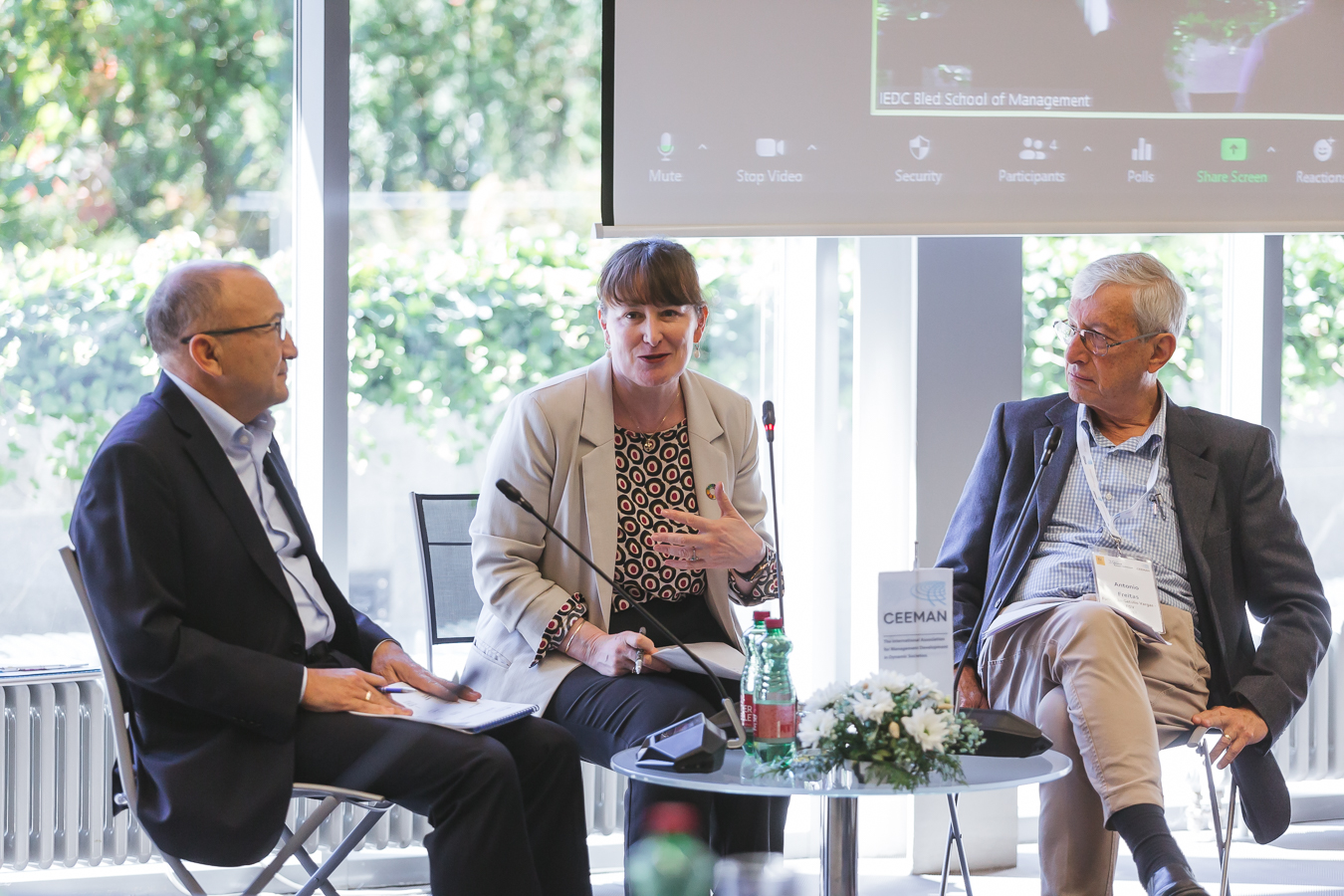 After we gave the floor to employers on the first day, the second day was dedicated to educators who talked about their own challenges and how to meet them. Nicola Kleyn, Dean of Executive Education at Rotterdam School of Management moderated the discussion, in which Assylbek Kozakhmetov, President and Founder of AlmaU, Kazakhstan, Antonio Freitas, Provost of FGV, Brazil and Xiaobo Wu, Dean, Faculty of Social Sciences, Zhejiang University, China shared their insights on the topic.
After we gave the floor to employers on the first day, the second day was dedicated to educators who talked about their own challenges and how to meet them. Nicola Kleyn, Dean of Executive Education at Rotterdam School of Management moderated the discussion, in which Assylbek Kozakhmetov, President and Founder of AlmaU, Kazakhstan, Antonio Freitas, Provost of FGV, Brazil and Xiaobo Wu, Dean, Faculty of Social Sciences, Zhejiang University, China shared their insights on the topic.
The official part of the second day was meticulously orchestrated by Conference Chair Drikus Kriek, Dean of IEDC-Bled School of Management, Slovenia and was brought to closure with two fantastic sessions.
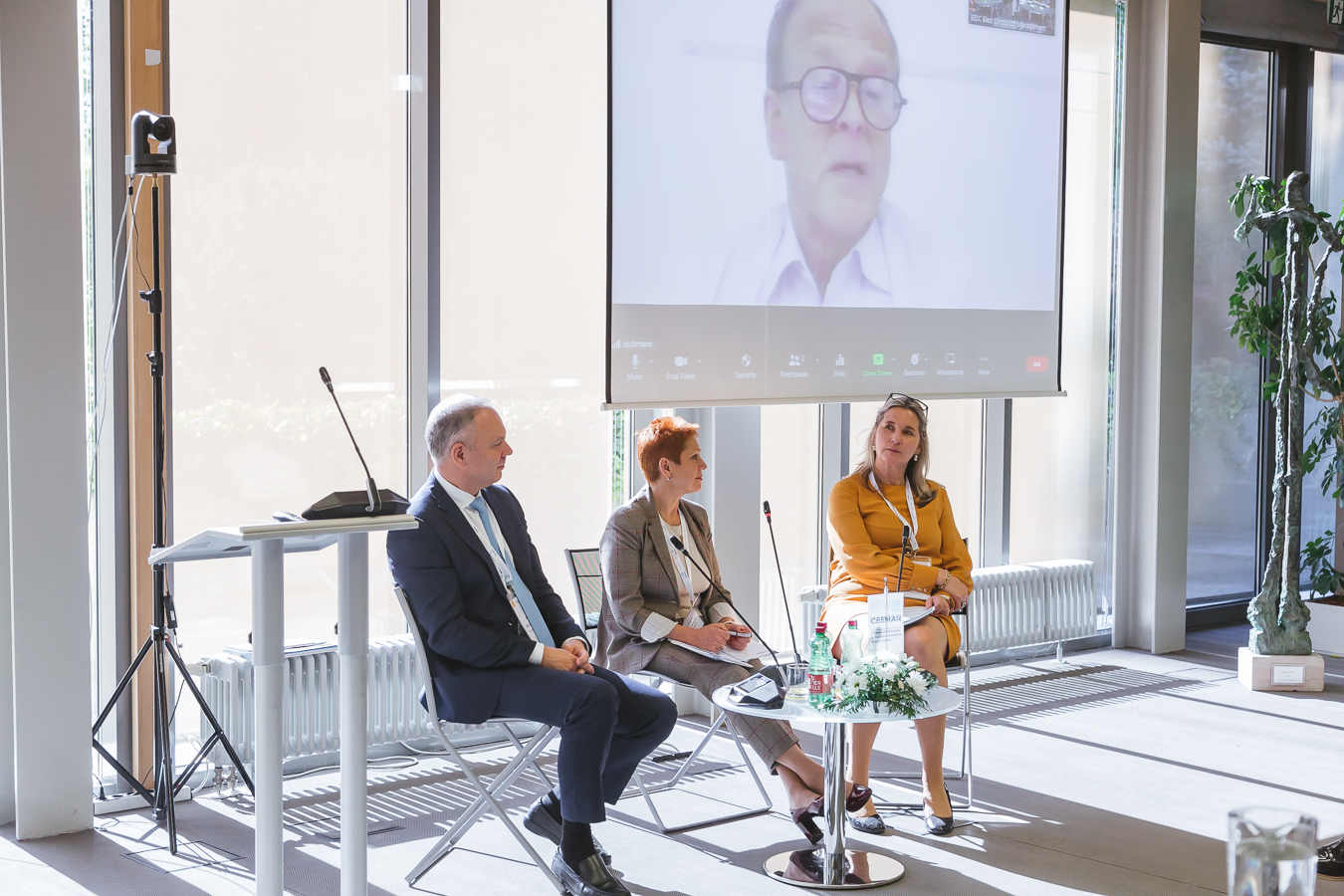 Three Scenarios for the Future of Management Education, moderated by Irina Sennikova, Dean of the Faculty of Business and Economics and acting rector of RISEBA University of Applied Sciences were explored by Nikos Mylonopoulos, Associate Professor of Digital Business at ALBA Graduate Business School, The American College of Greece on the topic of Digitalisation; Lisa Fröhlich, President of CBS International Business School, Germany touched upon Sustainability and Walter Jochmann, Managing Director Kienbaum Consultants International GmbH, Germany was presenting the latest findings on the topic of Understanding Work: Emerging Expectations vs. Established Wisdom.
Three Scenarios for the Future of Management Education, moderated by Irina Sennikova, Dean of the Faculty of Business and Economics and acting rector of RISEBA University of Applied Sciences were explored by Nikos Mylonopoulos, Associate Professor of Digital Business at ALBA Graduate Business School, The American College of Greece on the topic of Digitalisation; Lisa Fröhlich, President of CBS International Business School, Germany touched upon Sustainability and Walter Jochmann, Managing Director Kienbaum Consultants International GmbH, Germany was presenting the latest findings on the topic of Understanding Work: Emerging Expectations vs. Established Wisdom.
Final Plenary Session on “Business Schools on Mars and Other More Likely Scenarios for the Future” by Andrew Crisp, Owner of CarringtonCrisp and guest lecturer at CEEMAN Program Management Seminar (taking place each Spring), took us to the results of the survey CEEMAN conducted on the very topic before the conference which were presented alongside Andrew’s observations on the industry and the future trends.
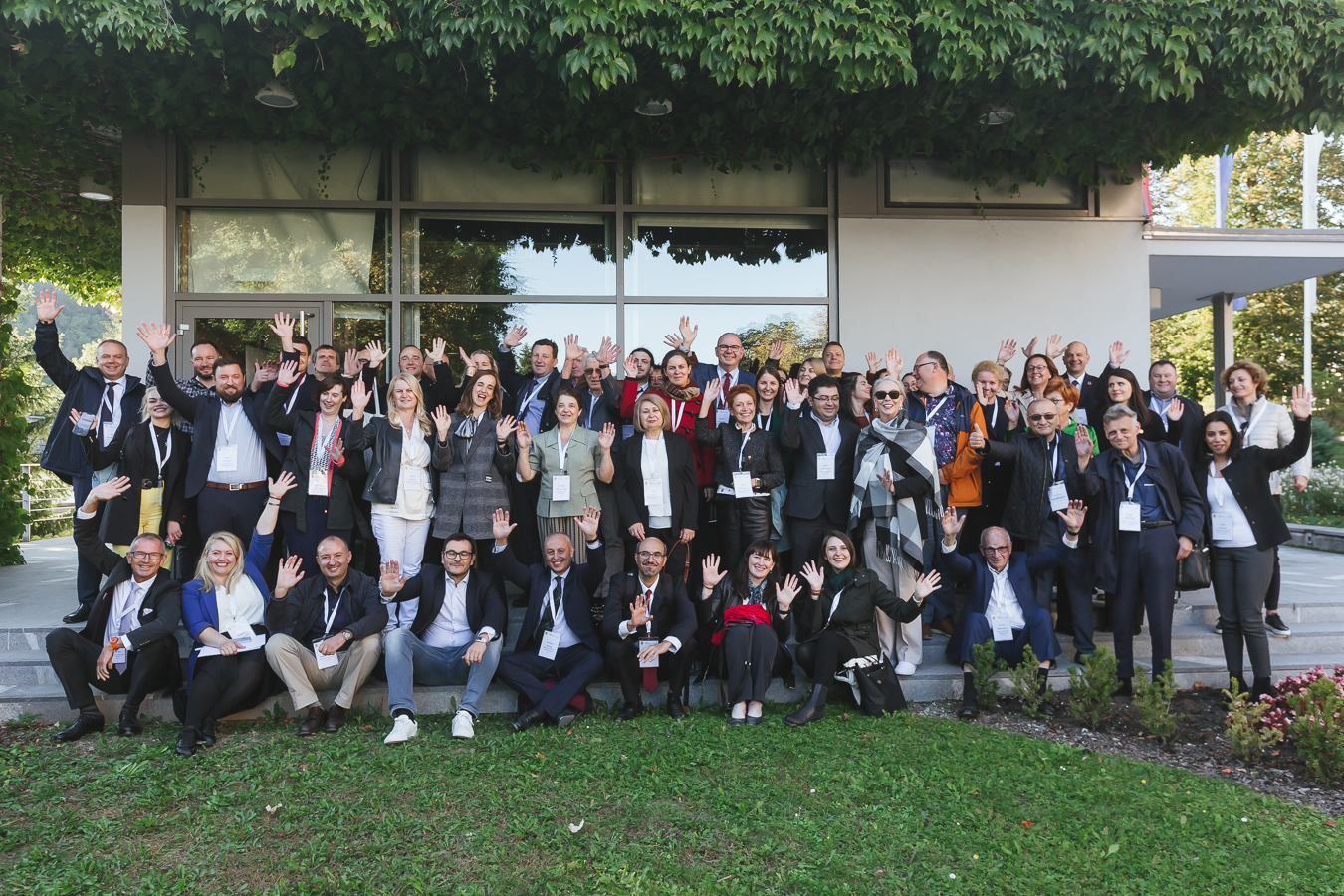
As is tradition with every CEEMAN Annual Conference, The Gala Dinner at Grand Hotel Toplice, overlooking the Lake Bled and Bled Castle, was a wonderful conclusion of the Conference – of course, with celebratory cake, live music and a dance!
The next Conference will be hosted by Almaty Management University in Almaty, Kazahstan (more details soon). Join us!
The 30th CEEMAN Annual Conference was supported by:
